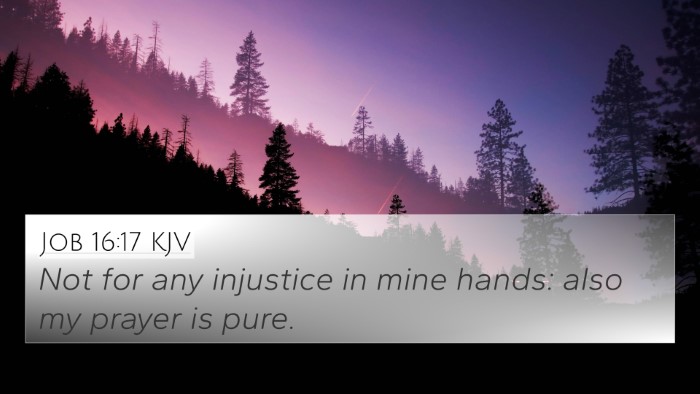Old Testament
Genesis Exodus Leviticus Numbers Deuteronomy Joshua Judges Ruth 1 Samuel 2 Samuel 1 Kings 2 Kings 1 Chronicles 2 Chronicles Ezra Nehemiah Esther Job Psalms Proverbs Ecclesiastes Song of Solomon Isaiah Jeremiah Lamentations Ezekiel Daniel Hosea Joel Amos Obadiah Jonah Micah Nahum Habakkuk Zephaniah Haggai Zechariah MalachiJob 35:2 Similar Verses
Job 35:2 Cross References
Thinkest thou this to be right, that thou saidst, My righteousness is more than God's?
Uncover the Rich Themes and Topics of This Bible Verse
Listed below are the Bible themes associated with Job 35:2. We invite you to explore each theme to gain deeper insights into the Scriptures.
Job 35:2 Cross Reference Verses
This section features a detailed cross-reference designed to enrich your understanding of the Scriptures. Below, you will find carefully selected verses that echo the themes and teachings related to Job 35:2 KJV. Click on any image to explore detailed analyses of related Bible verses and uncover deeper theological insights.

Matthew 12:36 (KJV) »
But I say unto you, That every idle word that men shall speak, they shall give account thereof in the day of judgment.

Job 10:7 (KJV) »
Thou knowest that I am not wicked; and there is none that can deliver out of thine hand.

Job 27:2 (KJV) »
As God liveth, who hath taken away my judgment; and the Almighty, who hath vexed my soul;

Job 40:8 (KJV) »
Wilt thou also disannul my judgment? wilt thou condemn me, that thou mayest be righteous?

Luke 19:22 (KJV) »
And he saith unto him, Out of thine own mouth will I judge thee, thou wicked servant. Thou knewest that I was an austere man, taking up that I laid not down, and reaping that I did not sow:
Job 35:2 Verse Analysis and Similar Verses
Understanding Job 35:2
The verse Job 35:2 contains a significant challenge posed by Elihu, one of Job's friends. He inquires about the nature of Job's complaints against God, pointing to the inherent limitations of human understanding of divine justice.
Commentary Insights
Drawing from the insights of public domain commentaries:
- Matthew Henry: Henry emphasizes the audacity of Job's questioning God's justice. Elihu's argument invites readers to reflect on the greater wisdom of God compared to human understanding.
- Albert Barnes: Barnes highlights that Elihu, unlike Job's other companions, provides a more nuanced understanding of suffering, suggesting it can serve a divine purpose rather than being mere punishment for sin.
- Adam Clarke: Clarke discusses the rhetorical nature of Elihu's inquiry, suggesting that it is designed to lead Job to a place of repentance and humility in recognizing God's sovereignty.
Theological Implications
The exploration of this verse opens a dialogue about the themes of divine justice and suffering:
- Divine Wisdom vs. Human Perspective: This verse illustrates the gulf between God's wisdom and our capacity to understand His workings.
- The Role of Suffering: Reflecting on Elihu's words, one may consider how suffering might serve a purpose beyond immediate human comprehension.
- Human Responsibility in Speech: Elihu urges Job to examine his words, pushing believers to be mindful of how they address God in times of trouble.
Cross-References
Job 35:2 can be connected to various other scriptures that delve into themes of divine justice, human suffering, and the robustness of faith. Here are some pertinent cross-references:
- Job 9:2: Discusses the difficulty of contending with God and the acknowledgment of God’s greatness.
- Psalm 19:9: Highlights the righteousness of the Lord as true and deserving of reverence.
- Romans 9:20: Raises questions about the right of the Creator to judge His creation.
- Isaiah 45:9: Speaks to the futility of questioning God’s decisions and counsel.
- James 1:5: Encourages believers to seek wisdom from God, who gives generously to all.
- 1 Peter 5:10: Offers hope that suffering is a temporary aspect of the Christian walk, leading to divine restoration.
- Proverbs 21:30: Affirms that there is no wisdom, insight, or plan that can stand against the Lord’s will.
- Job 36:26: Encourages awe in the presence of God’s majesty and understanding of His nature.
- Romans 8:28: Promises that God works all things together for good for those who love Him.
- Isaiah 55:8-9: God’s ways and thoughts are higher than ours, emphasizing His incomprehensibility.
Conclusion
In summary, Job 35:2 serves as a profound invitation to deepen one’s understanding of God’s justice and the human condition. Through cross-referencing and theological reflection, believers can engage with the text meaningfully and draw connections with other scriptures that illuminate similar themes.
Further Study Tools
For those seeking to delve deeper into the connections between biblical texts, various tools can assist in this journey:
- Bible Concordance: A comprehensive reference that lists words and their occurrences to aid study.
- Bible Cross-Reference Guide: Essential for locating related scriptures that provide additional context.
- Cross-Reference Bible Study Methods: Various methodologies can enhance understanding through thematic studies.
- Bible Chain References: A resource for following themes or stories across different books of the Bible.
- Identifying Connections: Learn how to discover links between the Old and New Testament teachings for a holistic view of scripture.
- Inter-Biblical Dialogue: Explore how scriptures converse with one another to reveal deeper meanings.






